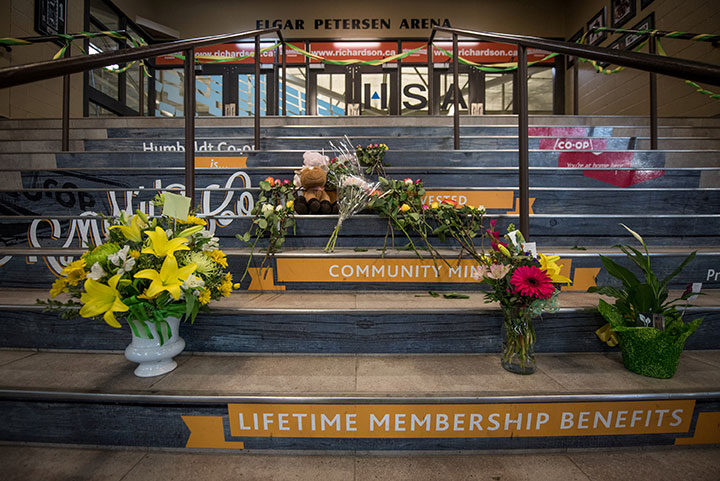The tragedy in Humboldt, Saskatchewan has sent emotional ripples across not just Canada, but the entire world.

People all over are grieving and offering support, whether or not they know someone directly impacted by the horrific crash that claimed 15 lives.
If this story has struck a chord with you, you’re not alone, and a Winnipeg psychologist says it’s important to lean on each other when dealing with something so sorrowful.
Dr. Rehman Abdulrehman with Clinic Psychology Manitoba said there’s going to be a normal grieving period, but how you progress from that is critical, not only sharing your thoughts with others, but trying to get back into a normal routine.
“It’ll be really important to make sure that we take time to honour but we also continue on with things that need to be done. The more we move away from everyday activity, the more that these things can affect us. It’s a balance between honouring and moving forward.”

Get daily National news
One of the reasons people far and wide have been hit hard is because they too are parents and can’t begin to imagine the pain being felt by those who lost their son. Dr. Abdulrehman explained the value of having an open dialogue with your kids about what happened.
“We don’t always talk about death and I think it’s really important for each of us to be able to identify our value systems, to be able to explain it, not just to ourselves but to children as well. And then to use age-appropriate descriptions on how to describe what happened. I think the more we try to guard ourselves from this concept that bad things won’t happen to us, the more we become affected.”
Dealing with trauma is something that paramedics know they will have to experience during their careers, and though they are trained to focus on the task at hand, the aftermath can be harrowing.
“People reach out to their colleagues. There’s a lot of informal processing that happens where the only people that know what you went through were the people that were there with you,” said Jen Lundin with the Paramedics Association of Manitoba. “Especially for large events like this, there would be more formal supports in place.”
The good that has shone through the darkness has been astounding, as exhibited by the skyrocketing GoFundMe page that has raised millions of dollars for the victims and their families.
If you’re looking for another way to help out, Transplant Manitoba is one possible avenue, inspired by the fallen Broncos player who donated his organs.
“I think Manitobans and Canadians in general, we’re generous people. We want to give that gift and help other people,” said Dr. Faisal Siddiqui, physician with Transplant Manitoba. “It’s important that if you know the wishes of your loved ones that you can make that gift, make their wishes come true when they pass. The most important thing to do is to make that decision and share those wishes with family and friends.”
If you want to register your intent to donate, you can do so at signupforlife.ca. According to Dr. Siddiqui, over 23,000 Manitobans have registered their intent.
“[Donating] is an amazing gift and an amazing decision people can make,” Dr. Siddiqui said. “We want to honor that.”
Transplant Manitoba isn’t the only life-saving organization seeing an increase in Manitobans wanting to help out.
Canadian Blood Services reports receiving 124 units of blood on Saturday: a more than 22 per cent increase over an average day.
- ‘Alarming trend’ of more international students claiming asylum: minister
- TD Bank moves to seize home of Russian-Canadian jailed for smuggling tech to Kremlin
- Why B.C. election could serve as a ‘trial run’ for next federal campaign
- Justin Trudeau headed to UN Summit of the Future amid international instability













Comments